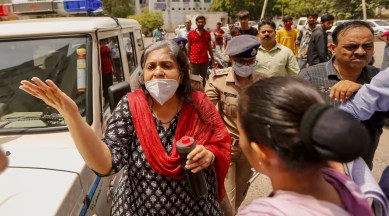Stay updated with the latest - Click here to follow us on Instagram
Gujarat riots: HC rejects Teesta’s discharge plea
The court of Additional Principal Judge Ambalal Patel, rejecting Setalvad’s plea, opined that “there is prima facie evidence” against her to frame the charges.

A day after the Supreme Court granted bail to Mumbai-based activist Teesta Setalvad, who is facing charges of allegedly fabricating proof linked to the 2002 Gujarat riots, a court in Ahmedabad on Thursday rejected her plea to drop proceedings against her before the charges are framed in the trial.
The court of Additional Principal Judge Ambalal Patel, rejecting Setalvad’s plea, opined that “there is prima facie evidence” against her to frame the charges.
monthly limit of free stories.
with an Express account.
The court took into consideration various witness statements and accounts relied on by the prosecution. It said that Setalvad’s grounds seeking discharge are more befitting to be made at the final stage after the entire judicial process is completed, and not for a stage when charges are yet to be framed.
Setalvad told the court that there is no question of falsifying affidavits, as no false affidavit was made in the Gulberg massacre case and that affidavits in the Sardarpura case were translated from Gujarati, explained to witnesses and then their signatures were taken.
It was also pointed out that the witness the prosecution is relying on – Raiskhan Pathan, former employee of Setalvad’s NGO who was eventually fired – had claimed that three affidavits of witnesses in the Naroda Gam trial were forged seven years after the riots. Pathan is also facing a case in this regard, Setalvad said.
The court was informed that it cannot be said that forged affidavits were submitted as the act of forgery has not been proven.
The state on the other hand opposed Setalvad’s plea stating that “by winning the trust of victims (of riots) or by abusing their trust” by drafting affidavits in English, which the victims allegedly couldn’t understand, Setalvad tried to implicate “innocent persons” and “misused the legal process as part of her conspiracy”.
On June 19, Additional Principal Judge A R Patel had dismissed the discharge plea of former Gujarat DGP R B Sreekumar, who is a co-accused in the same case.
At the time, the court had ruled while relying on several judgments, including six of the Supreme Court, that in the current stage it is only to be examined whether there is sufficient evidence against the accused to indict him. Other provisions such as those under Evidence Act or Commissions of Inquiry Act or limitation shall not come into consideration, it had stated.